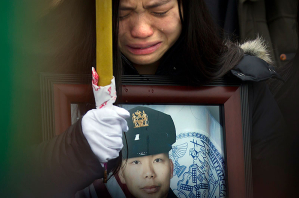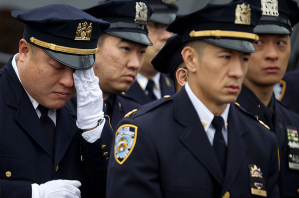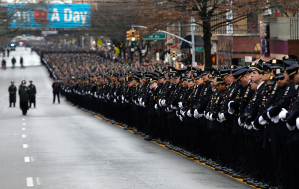
Many Asian-American police officers from across the United States showed up in New York City to pay their respects to New York police Detective Wenjian Liu, who was laid to rest on Sunday.
Liu, 32, who was gunned down alongside fellow officer Rafael Ramos in a squad cart in the Bedford-Stuyvesant neighborhood of Brooklyn, was a seven-year veteran of the New York Police Department. According to Kia Gregory of the Washington Post, he had also gotten married just a few months before his murder.
"Wenjian, you are the best son," Liu's father, Wei Tang Liu, said in Chinese through an interpreter. "You are the best husband. Also, you are our police officer and our best friend. Your action gave pride to all of us, and we are very proud of you."
Tang Liu also expressed his condolences to the Ramos family. The Washington Post reported that Liu's widow, Pei Xia Chen, thanked the officers and officials for honoring the memory of her husband.
"He took pride in the fact that he is NYPD," Liu's widow said.
Chen added that in addition to being a police officer, her husband had a passion for nature and his family. NYPD Commissioner Bill Bratton also eulogized about the fallen officer.
"He loved his family and they certainly loved him, as we see from so many who came from so far away," Bratton said. "And at the end of every tour, he would call his father, to let him know he was safe. At the end of every tour - but one."

Other Americans and Canadians of Chinese and Asian descent showed up to pay their respects for their fallen comrade. Toronto police Constable Qian L. Yang, an immigrant from central China who served as the Canadian city's police liaison to the Chinese community there according to NBC News, noted that he and Liu had something in common.
"When we saw the spelling of his name, we knew he was from mainland China, and we knew we had to go," Yang said. "We have the same background, the same culture. We wanted to show our respect."
NBC News reported that during Liu's funeral, a contingent of more than 100 ethnic Asian officers, who included Yang and about 20 Asian-Canadian Toronto constables, led the march toward the funeral home. Even the Chinese-American community came out in support of Liu.
"Liu is the pride of our Chinese, even though he is also the pride of every New Yorker," Helen Cai, a Chinese immigrant living in New York, said in Mandarin.
Detective Ron Bongat, a Filipino immigrant who has worked as a police officer near Chicago for 15 years, told NBC News that the deaths of Liu and Ramos may help strengthen ties between police and the communities they serve.
"I hope there is a sense of community and support for each other," Bongat said. "Not just for officers, but for the community as a whole."
Liu's death highlighted the role that Asian-Americans are increasingly playing in police units all across the country. David Chen of the New York Times noted that, at least in New York City, Asian-American officers have surged in their ranks to front-line roles.
"Twenty-five years ago, there were just 200 Asian-American officers in New York City," Chen wrote. "Now there are more than 2,100 in uniform, or six percent of the total, police statistics show. The percentage of academy graduates, moreover, has jumped to 9 percent, from 4 percent, in the last decade."

However, Americans of Asian descent haven't always been welcome to join the ranks of law enforcement. In addition to language barriers, the New York Times noted that the NYPD's 5-foot-8 height requirement for men, which was overturned thanks to litigation in the 1970s, disqualified many candidates who came from Hong Kong or China, where men are typically shorter.
"There's a long history of frustration," Hunter College professor Peter Kwong said about the relationship between the NYPD and New York's Chinatown. "When you complained they would say we don't know the community, we don't know the language. And since Asians didn't vote, there was no pressure on the police to be proactive."
Those who were able to successfully join the NYPD ranks also faced skepticism from the local population, according to retired NYPD officer Thomas Ong, who now works as a private investigator according to the New York Times. This was partly because many Asian immigrants, who came from repressive governments from countries such as China and Taiwan, had some suspicions of authority as a result.
"Some people refused to be arrested by me, even when I showed them the badge," Ong said. "They'd say things like, 'You're a cop? There are Chinese cops? I didn't know Chinese were cops.' "
According to the New York Times, many Asian-American officers chose their profession because of the allure of a steady Civil Service job. The typical career track for most Asian immigrants to the United States usually involve working in the legal, medical and engineering fields.
"Even though the elites get all the attention, this is the group that's comparable to most other immigrants and migrants that have entered into the American workplace," New York University historian John Kuo Wei Tchen said. "This is the working man's opportunity to move up the ladder."






